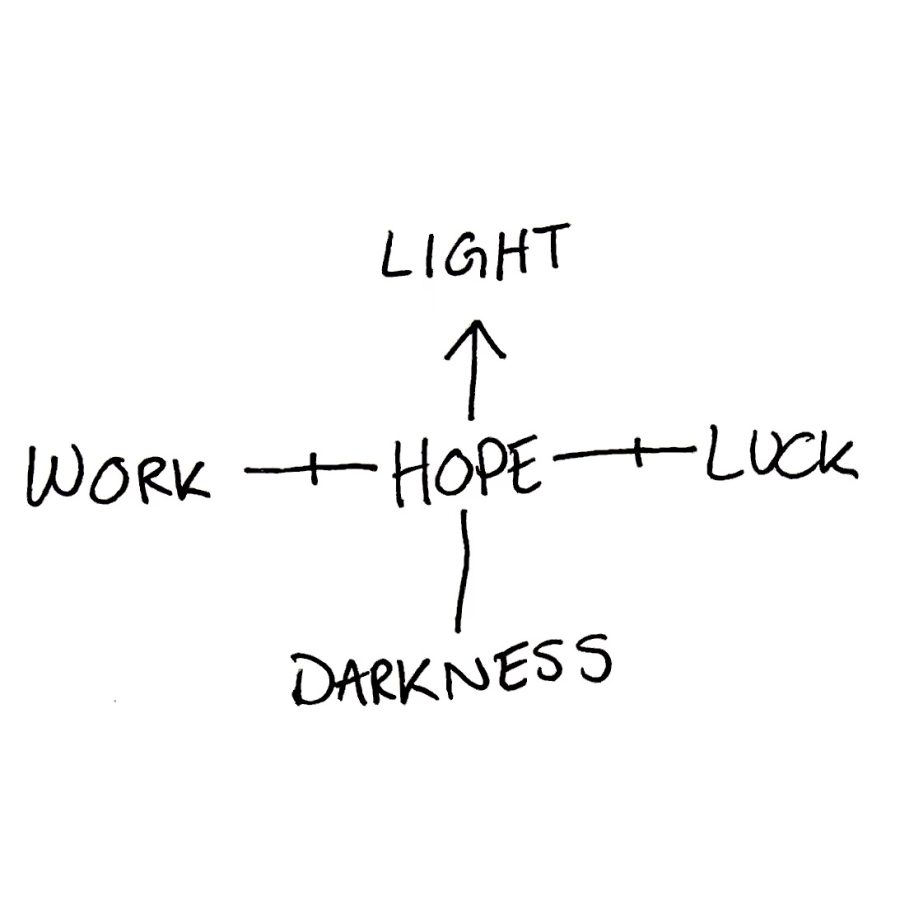The annihilation of hope
Hope as halfway between work and luck, as well as a guide from darkness to light. Art by the author
Apr 15, 2023
Companion piece to a column on dread, available here.
It’s an aggressive headline, and I’ll say up front that the column will be more about reimagining and contextualizing hope rather than annihilating it. I’ll try my best to give some definitions of hope, explain what it should and shouldn’t do, analyze some familiar quotes about hope and end with a new way to look at hope as a corequisite to meaning, rather than a prerequisite.
Hope gets used frequently in a variety of contexts, making it difficult for me to pin down a single definition. Most of the definitions I’ve found imply an expectation or a desire for things to go a certain way (e.g. I hope the Guardians win today; here’s hoping you get the Porter scholarship; I hope it’s not serious). In these examples, hope is an anticipatory state, forward looking, whether hoping that something happens or doesn’t happen.
In other examples, “I hope” begins a gesture of something we might want to be true but really means little (e.g. I hope you’re doing okay; I hope you get well soon). It could reflect a desire for something to be true, but I find the phrases carry confidence that something presently is the case rather than anticipation that it happens eventually.
Hope’s functionally equivalent opposite would probably be dread. Both are similar in that they superimpose the future onto the present, one with optimism and the other with worry. For something to be hopeless, then, it would need to still be located in the future, but would also have to be anticipated with dread rather than hope, faith, optimism (e.g. the Guardians are losing 10-0 in the bottom of the ninth, it’s hopeless).
As an emotion, hope describes looking forward in order to make the present moment more comfortable. At the very least, hope acknowledges a future and the possibility that it might be good. Faith functions similarly. Both faith and hope involve recognizing a difference between present and future as well as recognizing that the future cannot be controlled as much as we might like to believe. While hope involves an element of trust, faith (in something) adds a target: we delegate a lack of control to a higher power; call it God, the universe, fate, another person.
In a 2014 commencement speech at Maharishi University of Management (transcript here), Jim Carrey concludes with a word on hope versus faith. “I don’t believe in hope,” he says. “Hope is a beggar. Hope walks through the fire and faith leaps over it.”
I like to imagine hope as asking but not acting. Hope asks for credit after hard work and luck do the heavy lifting of accomplishment, bringing one as close as possible to achieving a goal. When Carrey says that hope begs, I think he’s implying that we can cover a lot of the distance that we might want hope to cover for us. If I want to get a good score on the LSAT, preparation is more useful than hope. Once the test is taken, however, I’d sooner find myself wishing I studied more rather than hoping for a good score.
The preview for a Psychology Today article tells me that hope “can help us manage stress and anxiety and cope with adversity.” I followed the link because I didn’t want to make a point that the article didn’t address. The article later told me that hope can “motivate positive action.” I take that to mean that hope can precede action. For example, a state of hope might magnetically attract someone to their goals, whether it’s weight loss, learning French, squatting 405, or putting out regular columns with self-made illustrations.
Hope is a beggar, to use Carey’s words, when hope replaces positive action. I’m not sure I agree with the sentiment; hope can motivate positive action, but it can also replace it. Hoping that our goals will be achieved for us, imagining that hope alone will make our wishes come true is foolish. At the very least, we should meet hope in between luck and work.
“Prepare for the worst; hope for the best.” Likely from someone’s grandmother or an old Instagram post.
I enjoy the quote. It implies the value of hope and the possibility of a desirable outcome. Crucially, though, it implies that hope without preparation does little. Preparing for the worst is bleak; hoping for the best without preparing for the worst is equally bleak. It’ll yield nothing. It brings to mind an old proverb I can’t positively cite (maybe Saint Augustine), but one that deserves a place here: “work as though everything depended on you; pray as though everything depended on God.”
“To hope against hope (for something).” It comes from Romans chapter 4, verse 18: “Against all hope, Abraham in hope believed and so became the father of many nations…” (NIV). I’ve used “hope against hope” and heard it used by people for emphasis more than anything else, but I think it emphasizes the rightful place of hope. To hope against hope that something happens recognizes a lack of control and defers the course of action entirely to chance and luck. To hope against hope invokes that one has reached a precipice of action, that one has done all that he can positively do.
“Hope is a great thing, maybe even the best of things, and no good thing ever dies.” From The Shawshank Redemption.
Perhaps the strongest testament for hope that I’ve ever heard, this quote is spoken by Andy Dufresne after he escapes Shawshank prison, where he would have spent a life sentence wrongfully imprisoned for murder. His position and mine have little in common, making it difficult to analyze. I have a much different perspective of hope than someone incarcerated, or someone recently exonerated.
The only thing that could make a hopeless situation more hopeful is hope. Hope understands the importance of doing all you can, and carries the torch from that point onward. Dufresne’s quote exemplifies the importance of hope amid uncontrollable negatives. Being slow to call things hopeless might correlate with the presence of hope in one’s own heart.
Before writing this article, my problem with hope was that it doesn’t seem like enough by itself. I assumed that hope was chosen over controllable actions, and that it promoted laziness, stasis and even regression rather than growth. Sometimes, though, hope can be the only thing connecting one good phase from the next; it may be one’s only companion through the darkness.
Eventually dies eventually, but hope doesn’t have to. It sounds simple, even obvious, but a world without hope is hopeless. Hope should be celebrated as a supplement, a corequisite to work and luck, incapable of replacing either but carrying necessary importance nonetheless. It’s a partially controllable mindset that makes an uncontrollable and often unforgiving world more hospitable. I hope I’ve made my points well, and hope that they find you well, halfway between action and luck.













